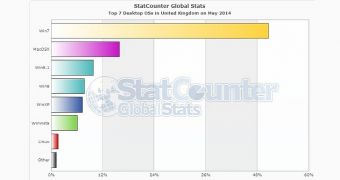Microsoft pulled the plug on Windows XP on April 8 and although millions of users around the globe are still running it, there still are some countries where XP is quickly losing ground.
The United Kingdom is one of the locations where users are quickly giving up on Windows XP in the favor of newer releases, such as Windows 7 and Windows 8.
Figures provided by market researcher Net Applications of the month of May 2014 in the United Kingdom reveal that Windows 8 has grown so much in the last few months that it finally managed to overtake Windows XP and, together with Windows 8.1, to gain more users than Mac OS X.
At this point, Windows XP is holding a market share of 7.22 percent, while Windows 8, Microsoft's modern operating system introduced in October 2012 is now powering 7.72 percent of the computers in the country. Windows 8.1, on the other hand, is even more popular, as it's now installed on 9.82 percent of machines being used by Britons.
Mac OS X gets the silver medal for its 15.85 percent market share, while Windows 7 is the operating system of choice of 50.62 percent of the desktop users in the United Kingdom.
The combined market share of Microsoft's modern operating system is 17.54 percent, which make them the second most-used platform in the country, just after Windows 7 and ahead of Mac OS X.
Although there's no doubt that Microsoft is pleased with such figures, it's still not enough to completely get rid of Windows XP, which continues to be installed on millions of computers across the globe.
The company says that it's time for everyone on Windows XP to move on and points to the long period of time that it supported this particular OS version as the main reason why it cannot be blamed for pulling the plug on it.
“In the past 12 years you’ve probably gotten a new phone, maybe a new TV, and possibly even a new car. Maybe it’s time for a new PC too, so you can make sure you have more memory and storage, faster processing speeds, and a higher-quality display (some even come with touch). And they’re less expensive than you might think,” the company said in a statement.
“We’ve been supporting Windows XP for the past 12 years—that's longer than we've supported any other operating system in our history and already two years longer than the standard ten years of support we normally provide. It’s time for us to look ahead so we can create better products and services for you and all our customers.”

 14 DAY TRIAL //
14 DAY TRIAL //